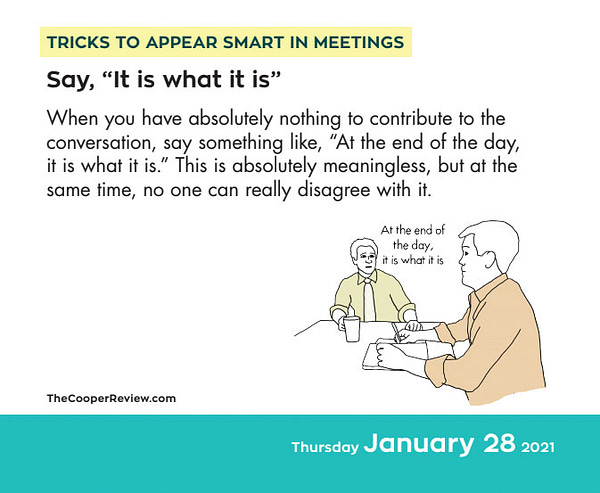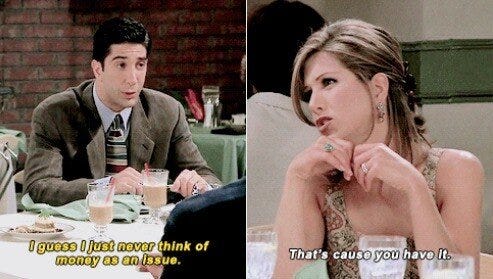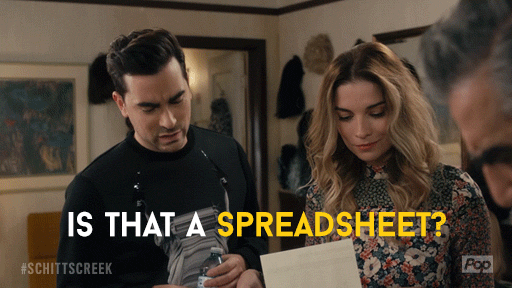Do you talk about money with your friends?
It's just not about discussing salaries and pay hikes.
In June 2021, the fifth issue of this newsletter went out to 83 people. More than a year later, it’s still the most-liked and one of the most-read issues I’ve ever written. However, the number of anon comments that came through made me realize that even though people are trying, we’re still a while away from fully destigmatizing money talks.
“This is so timely—I’ve tried to explain to people in life (including my roommate and my boyfriend) why it shouldn’t be taboo to talk about finances as a very practical topic, but they still think “it’s no one else’s business.” I’m gonna show them this.” - Anon
The other day, I was rewatching FRIENDS1 (I know it’s got flaws, but it’s so my comfort show — remember how we talked about acknowledging the problems when enjoying something?), and I came across a clip from an episode I’d almost forgotten about.
The One With Five Steaks and an Eggplant follows the six friends as they realize there are different monetary dynamics in the group. Half of them make more than enough to spend on what they want, on lavish stuff for each other, and then some. The other three are struggling to save, in low-paying jobs, and essentially always trying to play catchup with their finances.
When they finally talked about this openly, the whole situation was palpably awkward and tense. As it turns out, talking about money — even with your best friends — was super difficult in 1995 too.
It’s 2022 now — do you talk to your friends about money?
If you don’t, it’s as good a time as any to begin.
Now, I’m not saying that you have to open the conversation at dinner by asking everyone what they make — no. Talking about money isn’t just gaining intel on everyone’s salaries. There’s a time and place for that, but that’s not what we’re tackling today.
The goal is to be transparent about money in all forms. For example, if you’re having trouble keeping up with expenses and need to borrow from a friend for rent/living expenses — be upfront with them and tell them you’re in a crisis and need some help. They might have solutions to help you more than getting into credit card debt, borrowing from shady places, or stressing yourself into a hernia.
On a smaller scale, if you’re not able to fund some activities or experiences, need a budget version of a trip, or anything like that — are you able to be transparent with your friends about your financial situation? 1 in 4 millennials overspends to keep up with their peers.
If you can’t talk about money, fearing judgement, ridicule, or even pity, then it’s worth questioning the bones of your friendship and how to work on it. No one should have to spend more than they can afford (or sometimes even want to) to keep up appearances.
It’s awkward to talk about money
And it’ll continue to be until we start.
Who hasn’t lent a friend some money or paid at a place with promises to be paid back later? Except your definition of later is different than theirs. Sometimes theirs might mean ‘never’.
This is where if you’ve made it a point to talk about money with your friends, it’ll be marginally easier to ask for your money back. Sometimes you can let it go, but other times, when you can’t, you’ll be thankful you have a clear, pre-established way of talking about money.
Some of the most common reasons we have for not discussing finances with our friends include envy and fear of judgement. But honestly, if your friends are not happy for your successes and not willing to commiserate with you when you’re low, then are they really friends?
This means that sometimes someone in the friend group will make more money than others. Although, they might be able to afford better things — whether it’s their salary or help from a family member or spouse — it doesn’t mean you two shouldn’t still be able to discuss finances in a mature way.
Similarly, if you make less than your friends (and are somehow aware of the difference in your lifestyles), then it should be easy (or at least not difficult) to talk to them about it.
...bring up money with your [...] friends. Ask questions you may think are dumb, or talk about the issues you’re currently facing. Make it a topic as common and universal as dating.
Gatekeeping financial information isn’t being a good friend
Whether intentionally or not, many of us withhold information that could be potentially useful for our friends and loved ones — this also applies to financial information.
A few weeks ago, I talked about generational knowledge and how it’s essential we offer information unprompted because people often don’t know the right questions to ask or, really, that questions need to be asked at all.
For example, if you make finances a common enough topic, you could easily tell each other how to get a better deal on whatever they’re buying — a phone, a house, a car. Sharing information we all get from our parents keeps that information alive, and you never know who in your friend circle might find it helpful.
...ask questions if you don’t know something. “Do you guys have a 401k? Cause I’m not even sure what that is…” is a perfectly smart, healthy way to start learning.
New research has found that rich-poor friendships are vital in reducing poverty and the crux of it lies in sharing information. Over time, I can only hope this also includes financial information because getting higher salaries, negotiating better deals, and learning how to save properly are all vital pieces of info we should share with our friends when we have them.
We know keeping finances secret has a lot of benefits for companies. It’s even beneficial for people who run the household, making it easier for them to financially abuse their spouse by withholding money or funds. If you’ve made money talks easy and second nature, it might be helpful for anyone who’s abused to come to you and ask for help or advice.
At the end of the day, for a friend group that’s gone through so much, it’s ridiculous that it’s money that made the six friends on the show feel so awkward. Talking about money shouldn’t be shameful and certainly isn’t vulgar (especially for anyone telling girls and women that) — it’s empowering, practical, and valuable information for you and your loved ones in the long run.
I agree with what Erin Lowry, who writes Broke Millennial (which is a really useful newsletter/book series), said:
There’s something very magical about having that kind of vulnerability when you can have open and honest money conversations, and there’s also a lot you can learn from each other.
In the interest of transparency and friendship (you read my newsletter, I consider you a friend), here are some of the resources I turn to (none sponsored or whatever, I promise):
Your Rich Bff (US)
Her First 100K (Financial Feminism) (General/US)
Finance with Sharan (India)
Shreyaa Kapoor (India)
Neha Nagar (India)
Disclaimer: No money/investing advice here, all I’m telling you to do is be more open about money and discuss finances more openly with your friends.
What did you think of this issue?
Your anonymous feedback helps me improve. Thanks!
If you liked this issue (or like the newsletter in general), feel free to buy me a coffee or two — or you can just share it somewhere!
Things to check out this week 💌
A cool study on randomness that you can participate in and check out the results to see where you land.
The cube rule of food — it fits everything.
Speaking of food, apparently, it's soup season? Or something like that, anyway. While I still can't get behind soup as a whole meal, here are some amazing crowdsourced soup recipes for you to try.
Stories about the worst things people have spent money on.
Here's what happened within minutes on Wikipedia after Queen Elizabeth II died.
Tricks to appear smart in meetings:


Thanks for reading! Don’t forget to hit like and share this issue if you enjoyed it. 🖤
I’ll see you next week — maybe not at the same time, but definitely the same place.
10 Financial Lessons from FRIENDS (found this interesting and fun)







Insightful! Glad to have discovered your publication.
Incidentally, I was watching that very episode of Friends just two days ago, and I was thinking about how these six characters talk to each other about absolutely everything-- troubled pasts, dead parents, trauma, sex, etc.--with such ease, and it was oddly reassuring to watch them struggle to talk about money. The subject of money is so much deeper and more complex than we understand it to be.